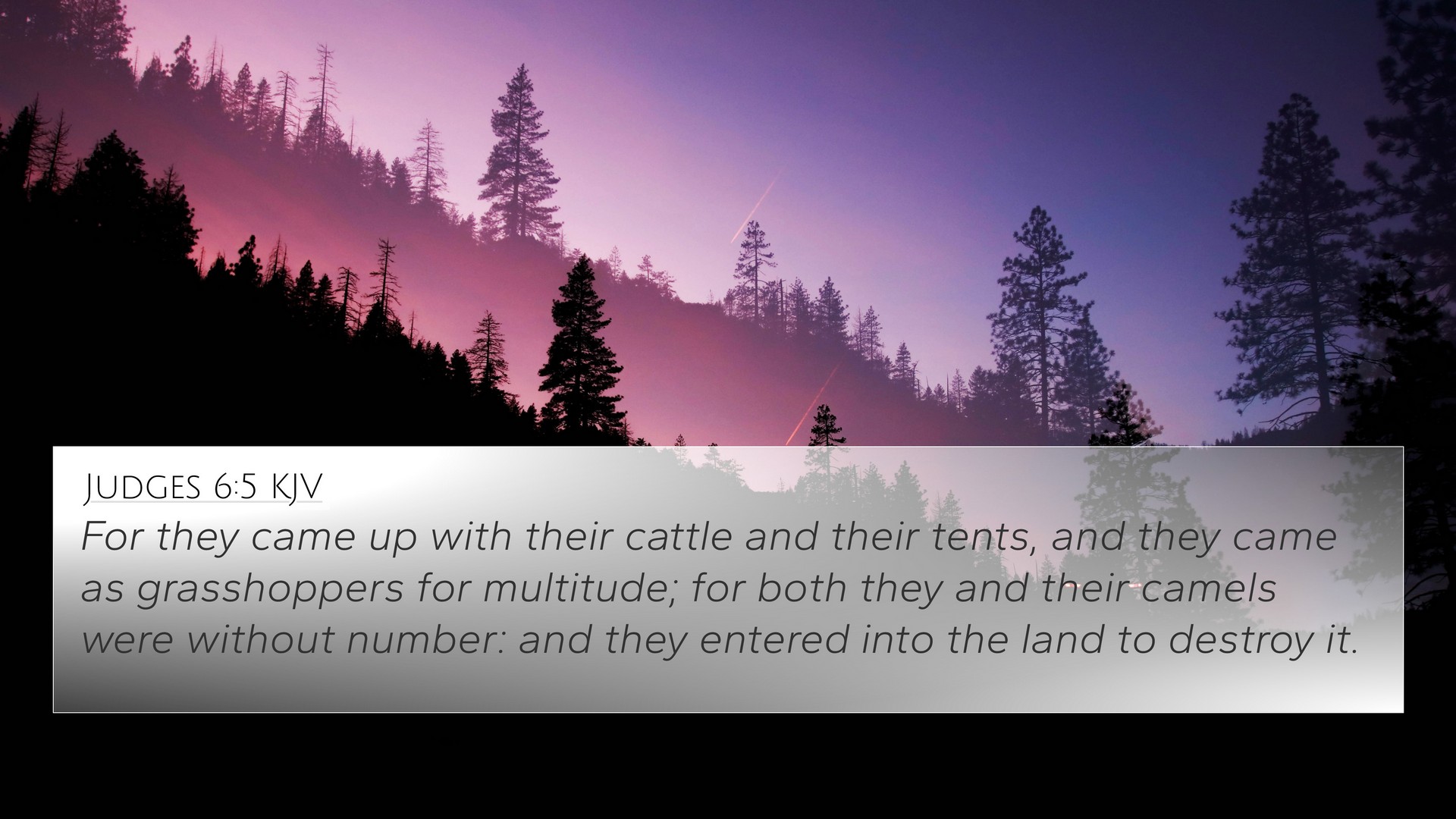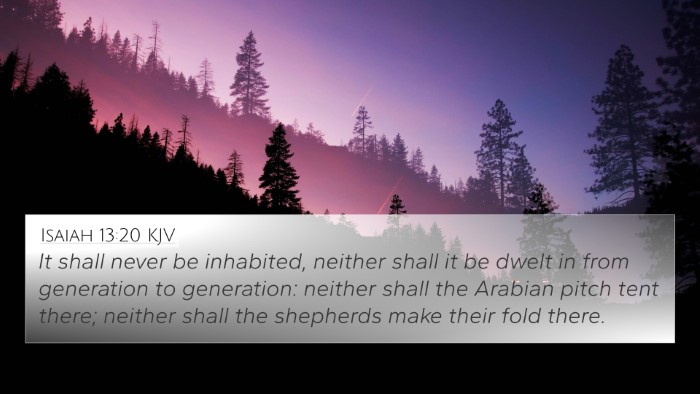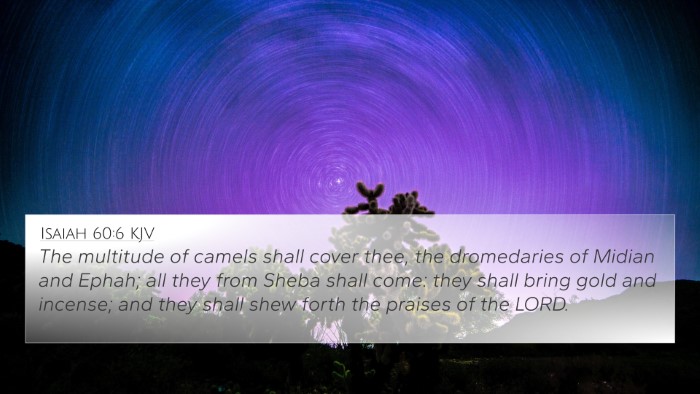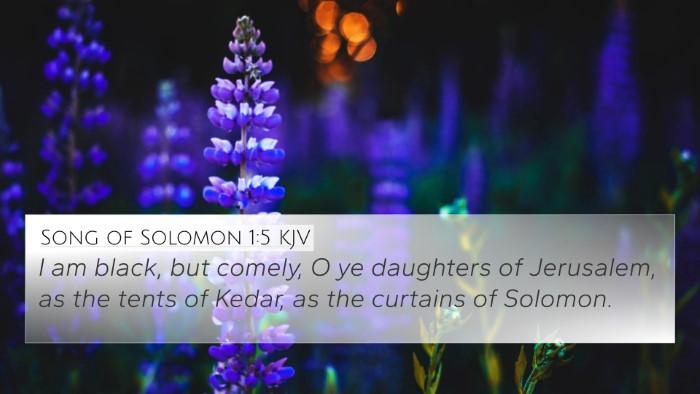Understanding Judges 6:5
Judges 6:5 states, "For they came up with their cattle and their tents, and they came as grasshoppers for multitude; for both they and their camels were without number: and they entered into the land to destroy it."
This verse describes the overwhelming invasion of the Midianites during a time of crisis in Israel. It highlights not only the sheer number of the enemies but also the desperation faced by the Israelites. To grasp the full context and theological implications of this verse, we can turn to several public domain commentaries.
Insights from Public Domain Commentaries
Matthew Henry's Commentary
Matthew Henry emphasizes the distress of the Israelites, noting that the Midianites' invasion was a divine judgment upon Israel for their idolatry. He explains that the "grasshoppers" metaphor aptly illustrates the multitude and insignificance of the Israelites' resistance against a force so vast and powerful. The comparison underscores the bleakness of their situation and their need for divine intervention.
Albert Barnes' Notes on the Bible
Albert Barnes adds to this by highlighting the tactical superiority of the Midianites. He discusses their mobility and the prowess of their camels, which allowed them to invade swiftly and with devastating effects. Barnes stresses the idea of God using foreign nations as instruments of judgment but also ultimately for the chastisement and correction of His people, signaling a return to faithfulness.
Adam Clarke's Commentary
Adam Clarke focuses on the condition of the Israelites as they faced this oppression. He indicates that the Midianites not only invaded but made the land desolate, crushing the crops and instilling fear. Clarke points out that the Israelites’ cry for help symbolizes a deep yearning for deliverance and restoration, reminding readers that after hardship, God is always present to save those who call upon Him.
Cross-References of Judges 6:5
To understand the connections between Bible verses that relate to Judges 6:5, here are some significant cross-references:
- Deuteronomy 28:47-48 - These verses outline the curses that would come upon Israel if they turned away from God.
- 1 Samuel 12:9-10 - Discusses how the Israelites forgot the Lord their God and were sold into the hands of their enemies.
- 2 Kings 6:16-17 - Involves the Prophet Elisha, showing that those with God are more powerful than those against them.
- Psalms 78:40-42 - Reflects on Israel's rebellion and God's compassion amid their suffering.
- Isaiah 59:1-2 - Describes the consequences of sin that separate people from God.
- Hebrews 11:32-34 - Honors the faith of judges and deliverers like Gideon, who solved problems through reliance on God.
- James 5:17 - Mentions Elijah, linking the Old Testament themes of prayer and divine intervention.
Thematic Connections and Biblical Analysis
Judges 6:5 is not merely a standalone episode but is woven into the larger narrative of Israel's cyclical disobedience, oppression, and deliverance. It resonates with:
- Thematic Bible verse connections such as the concept of divine judgment for idolatry.
- Bible verses that relate to each other, such as God's faithfulness in sending judges to deliver His people during crises.
- Inter-Biblical dialogue found in the New Testament's reference to faith and perseverance in God's deliverance, as seen in Hebrews.
- Comparative Bible verse analysis with other episodes of divine rescue, showing how God intervened in Israel's history.
- Scriptural cross-referencing to highlight the recurring theme of God’s mercy juxtaposed with human unfaithfulness.
Conclusion
In conclusion, Judges 6:5 serves as a powerful reminder of the consequences of turning away from God, the desperation in times of crisis, and the hope of deliverance through faith. By engaging with various commentaries and cross-referenced verses, one gains a deeper understanding of the narrative’s significance within the larger biblical context.
This verse invites believers to seek connections between biblical texts, use tools for Bible cross-referencing, and engage in transformative Bible studies that illuminate the continuous themes of struggle, redemption, and the faithfulness of God. It challenges readers to actively search for the underlying messages in the scriptures and how they relate to their personal lives.













